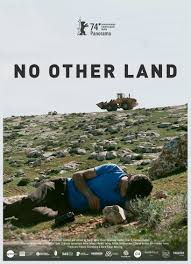
NO OTHER LAND
Occupied Palestinian Territory, 2024, 95 minutes, Colour.
Directed by Basel Adra, Yuval Abraham, Hamdan Ballal.
West Bank, 2019-2023, eyewitness photography, close ups on people, events on the record.
Palestinian law student, Basel Adra, remembers his upbringing on the West Bank, the protests during the 2000s, the Israeli military, conflict. With his camera and his phone, he began filming the arrival of Israeli military, into the villages of Masafer Yatta, in the hills near Hebron, tanks and heavy machinery sent in to demolish houses and homes, sometimes schools, often with very little time for locals to remove their possessions. And there were other photographers who joined over the years.
Basel became friendly with an Israeli journalist, Yuval Abraham, who took the side of the evicted Palestinians, writing articles, witnessing the incursions, empathising with the people, a bond with Basel, much the same age, living only 30 km from each other, Yuval free to move, Basel not allowed to cross borders, studies in the past but not able to practice law, admiring his father who was jailed in past protests, but now running a small service station. Yuval is impatient for some justice, but Basel reminds him that this struggle has been going on for a very long time, long-suffering patience and protest.
The film’s perspective is that of the Palestinians eliciting audience empathy, as we watch the planned destruction of homes over the years, some families having to move and live, literally, in caves. The view of the Israeli military is unsympathetic, tanks, guns, the heavy equipment, personal hostility. The official reason given for the demolition is that Israel wanted this area for a military training ground – but, an indication later in the film states that this was an official pretext for the removal of the Palestinians.
While there are many intense discussions between Basel and Yuval, the cameras spend a great deal of time personalising the issue, especially scenes with playful children, anxious women, roadside protests, the arrest and imprisonment of Basel’s father.
The dire situations shown are reminiscent of the behaviour of colonial powers in the 19th century, alarming that there should be such “colonial” superior attitudes from one group towards another in the 21st-century. And for many years, this has been symbolised by the high wall separation between Israel and the West Bank.
There is a postscript to the film with final footage taken at the end of 2023. Then came the brutal Hamas’ attack, the hostages, the bombardment of Gaza. Audiences will look at No Other Land with some dismay at the events 2019-2023 but also in the light of the increasingly vast warfare of 2024, the effect on Israel, the grim experience of Palestinians.
- The title and its tone? Sad? The experience of Palestinians, the West Bank, Gaza?
- The director young, his background, studies, lack of opportunity, his camera, phone, the filming, the other photographers, the range of material, the editing, pace, evocative?
- The situation for the villages of Masafer Yatta, the Palestinians living there for so long, their homes, work, flocks? The focus on the ordinary people, the children and their play, school, innocence? The adults, the men and their role, the role of the women?
- Basel, the scenes of his childhood, the protests, his father going to jail? Growing up with this perspective? His filming, his commentary? Admiration for his father? His father in jail in the past, the service station, participating in the protests, going to jail again?
- Yuval, Israeli journalist, his arriving, sympathies, people wary, friendship, hospitality? The filming? His discussions with Basel, incorporated into the film, his opportunities, education, living 30 km away, freedom of movement, contrasting with Basel and his experiences and limitations? His impatience for things to be achieved, Basel tempering his expectations?
- The Israeli military, the training ground for the Army, the soldiers, their weapons, the tanks, the heavy equipment, the quick demolition of the homes, the inhabitants trying to save their possessions, some having to live in caves, setting themselves up, the scene of fighting for the generator against the military? Another step in their experience of oppression?
- The period of four years, the succession of years and the gradual elimination of the homes, scattering of the flocks, the episode of the children at school the demolition of the school?
- The filming of the Israeli military, that action, hostilities, the protests and clashes, the shooting of one man, hospital, quadriplegic, living in the cave, cared for by his mother, the journalist coming to photograph him, but not necessarily helping him? The report of his death?
- The scene of the settlers, neighbours, their homes compared with the Palestinian homes, 2024, the settlers attacking the Palestinians, with weapons, shooting?
- The protests, Basel and his involvement, his father and his determination, the confrontations with the military, being in jail, effecting his release?
- The sadness of the women, homes, caring for the children, for the injured? The care and anguish of the mother of the quadriplegic? The children and their playfulness, experiencing this kind of operation?
- October 2023, the consequences for Israel, for Gaza, for those in the West Bank?
- For audiences around the world, remembering Palestine, British rule, the state of Israel, the status of the Palestinians, the wars, power, and in the light of 2024?